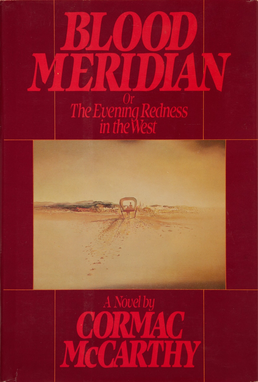Part 13
byIn Part 13 of Blood Meridian, the story takes a dark turn as a group of mercenaries, including Glanton, head northward through the harsh wilderness. The group, riding in the cold morning light, has a brutal reputation, and their arrival in town is marked by the display of severed heads and scalps from their violent missions. Their commander, Glanton, leads the men with purpose, while the townspeople, caught between fear and awe, react to the gruesome trophies. Local authorities, including the governor’s lieutenant, welcome them with promises of payment, indicating the power these mercenaries hold. The fear in the air is palpable as they are treated like figures of importance, despite their bloody history. The people are unsure whether they should view these mercenaries as a necessary evil or as an ominous threat.
The scene shifts as the mercenaries, seeking respite, visit a public bathhouse. Here, they cleanse themselves of the dirt and grime from their violent journey, revealing scars and tattoos that serve as a testament to their brutal past. Among them is the judge, a tall and imposing figure who stands out due to his lack of body hair, adding to his already unnerving presence. The judge’s aloofness and his detached air contrast sharply with the other men, and his strange demeanor only adds to the growing tension in the town. Meanwhile, the townsfolk, eager to capitalize on the mercenaries’ arrival, offer goods and services, showing an opportunistic side that contrasts with their fear of the mercenaries. Despite their trepidation, the town is drawn to the money and power that these men represent, creating an uncomfortable dynamic between the two groups.
Night descends, and the atmosphere shifts to one of drunken revelry. The mercenaries, adorned with their gruesome trophies, make their way to the banquet hall, where they indulge in food, drink, and violent behavior. The banquet quickly turns chaotic, as fights break out among the men, and the violence escalates into a full-blown frenzy. Glanton, as the leader, distributes the spoils of gold among his men with a sense of cold authority, reinforcing his command over the group. The night becomes a blur of gluttony and savagery, with little regard for the lives or well-being of those around them. The mercenaries’ actions reflect the lawlessness of their existence, where power is maintained through force and dominance, and morality is abandoned in the pursuit of survival.
The story then takes a darker turn as the mercenaries, intoxicated by their newfound wealth and violence, slaughter a peaceful group of Tigua Indians without provocation. Their actions are merciless, leaving behind a scene of destruction and bloodshed. The brutality of their behavior serves as a chilling reminder of the savage world in which they exist. With no remorse for their actions, they continue on their journey, treating every native they encounter as an obstacle to be removed. Their reputation for savagery continues to grow, as they leave behind a trail of violence and death, reinforcing the idea that in this world, survival often comes at the expense of others. The group’s descent into madness and violence seems inevitable, and their journey becomes increasingly defined by the brutal choices they make.
As they approach the city, tensions rise, and the governor’s promised rewards begin to lose their luster. The mercenaries’ violent actions have begun to catch up with them, and the people they encounter start to question whether these men are truly worth the price they demand. The fear of retribution begins to hang over the group as their bloody past catches up to them. Their presence in the town is no longer seen as a sign of power and prestige but as a reminder of the chaos they have caused. Their journey through the desert has left them morally bankrupt, and the inevitable consequences of their actions seem to be drawing nearer. In this chapter, the brutal and unforgiving world they inhabit continues to unfold, with each step further into violence and depravity leading them down a path from which there is no return.

